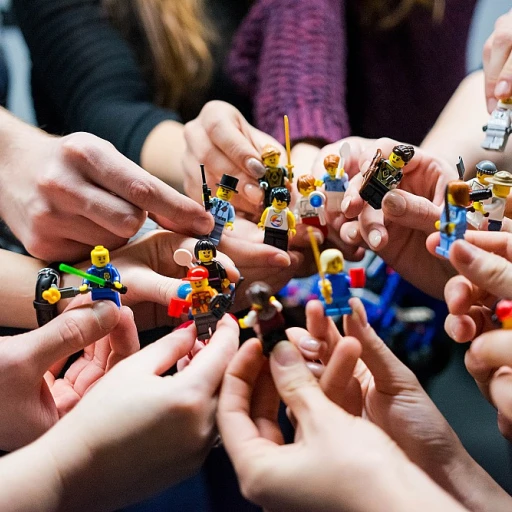
Understanding the Importance of Recognition
Highlighting the Power of Genuine Recognition
In the healthcare industry, appreciating the hard work of your clinic team goes beyond mere words. Employees, especially healthcare professionals, often work under high-pressure conditions, where each task directly impacts patient care and outcomes. Recognizing this effort not only enhances employee engagement but significantly uplifts the morale and dedication among staff members. Acknowledging team-based achievements and individual performances fosters a supportive work environment where employees feel valued.
The act of recognition doesn't just involve congratulating a job well done. It's about understanding and pinpointing what makes your staff and team members tick. Diving into the preferences of each healthcare worker, and tailoring rewards based on their individual needs, boosts the efficacy of any recognition program. Whether through monetary incentives or non-monetary tokens of appreciation, aligning rewards with what employees value most is crucial.
Beyond personal recognition, creating a comprehensive recognition framework can lead to long-term improvements in staff performance. Employee recognition programs, whether incorporating peer recognition or team-based rewards, help in building a culture of appreciation. They serve as a constant reminder of the organization's commitment to valuing staff contributions which, in turn, positively impacts organizational success. Implementing such programs aligns the workforce with the organization's goals, making healthcare employees more invested in their work.
Tailoring Rewards to Individual Preferences
Personalized Approaches to Boost Recognition
When it comes to recognizing employee contributions in the demanding healthcare industry, understanding "one size does not fit all" is key. Tailoring rewards to meet individual preferences can significantly boost employee engagement and foster a culture where healthcare workers feel valued.- Identify what motivates each team member. Begin by observing what your employees enjoy. Some healthcare professionals may value public acknowledgment of their hard work, while others might prefer a one-on-one conversation. Understanding these nuances can greatly influence how appreciated your staff feels.
- Consider diverse forms of recognition. Monetary rewards are not the only way to show appreciation. Non-monetary options, such as personalized thank-you notes, dedicated "employee of the month" parking spots, or an extra day off, can make a meaningful impact. Recognizing contributions through peer recognition programs can also reinforce positive behaviors, boosting overall performance and patient care.
- Leverage team-based recognition activities. Encourage healthcare employees to engage in team-building sessions or celebrate collective achievements. Facilitating team appreciation meetings can further enhance the spirit of collaboration among healthcare workers, fostering an environment of mutual support and understanding.
Monetary vs. Non-Monetary Rewards
Emphasizing Value Beyond Money
In today's healthcare industry, recognizing the hard work and dedication of your clinic team goes beyond traditional monetary rewards. While financial incentives are always appreciated, they may not resonate equally with all healthcare professionals. As an organization aiming to foster employee engagement and commitment, it's crucial to explore a variety of recognition ideas and tailor rewards to accommodate the diverse preferences of healthcare employees.
Non-monetary rewards can often have a more meaningful impact on employee engagement and their sense of being valued within the healthcare organization. Consider implementing a peer recognition program that allows staff members to publicly acknowledge each other's contributions to patient care and the clinic's overall performance. This kind of recognition can strengthen team-based support and boost morale within the team. Recognition programs that include rewards based on employee performance, such as additional professional development opportunities or extra time off, can also be quite effective.
Moreover, a successful recognition program shouldn't be limited to a one-size-fits-all approach. By actively connecting with your healthcare team and understanding their unique desires, you'll be better equipped to implement a recognition strategy that speaks to each staff member personally. This level of personalized recognition helps employees feel valued and appreciated for their contributions, ultimately contributing to a positive and dynamic work environment.
Creating a Culture of Appreciation
Building a Culture That Celebrates Achievements
Creating a culture of appreciation within your clinic is vital for fostering a positive atmosphere where employees feel valued. Healthcare professionals work tirelessly, delivering exceptional patient care, and it's essential for them to know their efforts are recognized and valued. Here's how you can cultivate this environment:- Recognizing Day-to-Day Achievements: Make it a habit to recognize even the small wins. When staff members achieve milestones, whether related to patient care or team efficiency, acknowledge it promptly. This could be through a quick team meeting or a simple note of appreciation.
- Implementing a Peer Recognition System: Encourage employees to recognize each other. Peer recognition programs allow team members to highlight each other's hard work and achievements, bolstering morale. This system empowers staff to support and celebrate one another's successes.
- Encouraging Open Communication: A culture of appreciation thrives on open feedback and communication. Team members should feel comfortable sharing their thoughts and suggestions. Create forums or meetings where staff can express gratitude or give positive feedback openly.
- Leadership Involvement: Leaders play a crucial role in modeling appreciation. When leaders actively participate in rewards recognition, it sets a standard for the organization. Encourage management to personally thank employees and participate in recognition programs.
- Utilizing Recognition Programs: Implement structured employee recognition programs to ensure consistent acknowledgment. These programs support team-based goals and provide clear criteria for rewards, whether monetary or non-monetary.
Leveraging Technology for Recognition
Utilizing Technology to Enhance Recognition Efforts
As healthcare professionals continue to navigate a demanding work environment, the integration of technology in employee recognition has become pivotal. The healthcare industry, often celebrated for its dedicated team of healthcare workers, can benefit immensely from digital advancements designed to enhance care, support, and recognition.
Engaging effectively with team members through technology not only streamlines the recognition process, but also allows organizations to foster a more connected and supportive environment. By using digital platforms, healthcare organizations can ensure their staff members are acknowledged for their hard work and contributions to patient care, irrespective of their location or shift timings.
Consider these technology-based recognition strategies to amplify your reward programs:
- Digital Recognition Platforms: Deploying platforms that support peer recognition can greatly enhance team-based morale. These tools offer employees the opportunity to celebrate one another's achievements, fostering a culture of appreciation that aligns with your organization’s goals.
- Automated Reward Systems: Implement reward recognition systems that automate the distribution of both monetary and non-monetary rewards, ensuring a seamless and timely acknowledgment of employee performance. This approach can be particularly effective in recognizing healthcare employee efforts in high-pressure situations.
- Mobile Applications: Utilize mobile apps that allow staff to recognize peers instantly or receive updates and notifications about the latest recognition programs. This instant accessibility makes employees feel valued and keeps them engaged.
- Data Analytics: Leverage data analytics to track recognition trends. This information can offer insights into which strategies are most effective, helping tailor future recognition ideas that align with employee preferences and organizational objectives.
Integrating technology not only addresses the practical needs of recognizing healthcare employees across diverse settings, but it also reinforces a culture of continuous appreciation. Such efforts ensure that team members feel acknowledged, leading to increased employee engagement and better healthcare outcomes. Embracing these digital tools will support organizations in maintaining a motivated and cohesive team dedicated to the highest standards of patient care.
Measuring the Impact of Reward Programs
Assessing the Impact of Your Appreciation Initiatives
When implementing recognition programs in your healthcare team, it's crucial to measure their effectiveness to ensure they are providing tangible benefits. A recognition program that genuinely affects employee engagement and patient care is one that evolves based on real feedback and data. Start by analyzing employee performance data and patient care results before and after the introduction of the recognition initiatives. These metrics can help you determine whether your team-based recognition programs are leading to improved outcomes.- Employee Feedback: Regularly conduct surveys or feedback sessions with your employees to garner insights into how the recognition program is perceived. Are staff members feeling more valued? Are they motivated to maintain high standards of care?
- Performance Metrics: Evaluate key performance indicators to understand the impact on work quality and productivity. Teams that frequently receive peer recognition and rewards may show increased collaboration and efficiency.
- Patient Satisfaction: In many healthcare settings, a well-appreciated and motivated team correlates with higher patient satisfaction scores. Track these metrics to ensure your appreciation efforts are enhancing the patient experience.
- Program Adaptation: Use the data collected to refine and adapt your recognition programs. Tailor them to suit individual and team preferences, ensuring they remain relevant and effective in boosting morale and performance.











